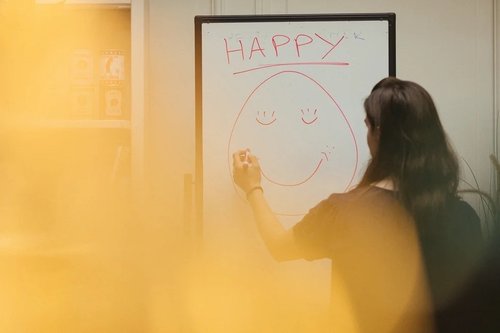The Abilene paradox: a challenge to strategic decision-making
Oct 31, 2023
4 mins


Journalist & Content Manager
Why are we agreeing on a solution when each of us thinks it’s wrong? This is called the Abilene paradox, a phenomenon in social psychology that we’ll dissect to better counteract it.
Have you ever found yourself at the movies watching a flick you didn’t even want to see? Then, later, you realize your friends who saw it with you felt the same way. This is the Abilene paradox, and when it occurs within the walls of an office or in a Zoom meeting, its consequences are more troublesome than a flop at the show.
Once upon a time in Texas
The Abilene paradox was coined in 1974 by sociologist Jerry Harvey. “Here’s the backstory: the Abilene paradox was the result of an experience Harvey had and then conceptualized,” explains Albert Moukheiber, neuroscientist and clinical psychologist. It all began in Harvey’s home on a hot Sunday with his family. Everyone was bored, so when Harvey’s father-in-law came up with the idea of eating lunch in Abilene, the big city 60 miles away, his family members looked at one another and agreed to go.
Unfortunately, the trip spiraled into a nightmare. It was blazing outside, and the car was old with no AC. After arriving in Abilene, Harvey and his family wandered around for a long time before finding a place to eat. When they finally located a restaurant and sat down, the food was bad and expensive. It was a complete disaster. An argument surfaced and Harvey’s father-in-law defended himself, saying he didn’t even want to go to Abilene in the first place. He had only suggested it, thinking it would make the others happy. By the end of their discussion, the entire family admitted the truth: no one had wanted to go to lunch in Abilene. “What we need to remember about the Abilene paradox is that a group agrees on something that is actually the opposite of what each person wants, including the one who initially suggested the idea,” Moukheiber says.
The Abilene paradox has a domino effect that creates interference as theorized by Olivier Sibony, innovation management expert and professor of strategy. “What we observe in a group is that the first person who speaks sets the tone by indicating what they believe to be the right decision. The second person expressing their opinion may not have agreed, but their disagreement likely won’t be conveyed as resolutely as if they had spoken first. The second person’s point of view is prone to coincide with that of the first person, and if you’re the third person speaking, there’s a strong probability you’ll agree with the first two,” he explains.
Something is better than nothing
Why suggest an idea we don’t like? Or support one that someone else says? At first glance, we could mistake this as social conformity, a desire to avoid confrontation and not make waves, or maybe we even agree to a bad idea out of laziness. “It’s true that this can perpetuate the Abilene paradox, but it’s not the origin of the phenomenon,” says Moukheiber. The real reason is that “nature abhors a vacuum,” as Aristotle said. “Often, we prefer to do something rather than nothing,” Moukheiber adds. Typically, we think it’s better to throw out a bad idea in a meeting, rather than no idea at all, and when no one has a better idea, we feel pressure to stand behind the unclear agreement. What’s worse, the Abilene paradox is exacerbated if an idea comes from the boss or the boss’s boss.
“This phenomenon happens all the time, especially when people are afraid to be silent or admit they don’t know the answer,” says Daniel Piana, a specialist in innovation and human resources at Magellan Partners. The Abilene paradox is further amplified in a society of immediacy, where everyone offers their opinion freely, regardless of whether it falls under their area of expertise. This reality was evident during COVID-19 when many doctors and scientists expressed their ideas without being masters on the subject.
The Abilene paradox has another downside. “Its false benevolence curbs discussions and prevents us from having the kind of back-and-forth conversations that drive innovation,” Piana laments. Ultimately, it’s often in casual conversations that everyone critiques a decision made within a group. This small talk creates a negative atmosphere where people shift blame and hinder improvement.
Recommendations to avoid the Abilene paradox
(especially during meetings):
Prepare the agenda in advance and encourage everyone to express their ideas and opinions in writing before the meeting. “The ability for ideation on an unforeseen topic is significantly reduced,” says Piana.
If you’re a manager, don’t reveal your thoughts about an idea at the beginning of the meeting.
Make sure there’s an equal distribution of speaking time so everyone has a chance to share their ideas and opinions. “You need to be even more attentive in hybrid meetings because it’s harder for remote participants to speak,” Piana emphasizes.
Allow sufficient time for communication. Not giving enough time for opinions, ideas, or questions results in false debate. “If we can’t debate or acknowledge that we don’t agree with each other, we will inevitably fall into vague consensus. One of the roles of a good manager is to draw out the opinions of people who don’t express them automatically and create conditions where everyone feels free and safe to convey their thoughts,” says Sibony.
Plan a post-meeting to analyze what was discussed and use the double diamond technique. The first diamond opens the debate to discussion and discovery. Once all the ideas are on the table, the second diamond selects the best ones and closes it. The same process is used to deliver solutions. “This second phase is essential, but unfortunately, it’s often forgotten,” Sibony says, “and this encourages a leader to make their own decisions among the ideas presented without collectively delving into how the ideas can be concretely implemented.”
Sibony emphasizes the importance of addressing this issue in the long term. With certain methods in place, you can establish effective brainstorming sessions, but bad habits creep back in if you haven’t instilled a corporate culture conducive to psychological safety. “This will allow knowledgeable employees to speak up, even if they’re lower in the hierarchy, and we must avoid futile statements that kill debate,” Piana urges. Let’s remember the age-old proverb from the Greek poet Menander, “Better to keep quiet than to talk and say nothing.”
Photo: Welcome to the Jungle
Translated by Lorraine Posthuma
Follow Welcome to the Jungle on Facebook, LinkedIn, and Instagram to get our latest articles every day, and don’t forget to subscribe to our newsletter!

More inspiration: Our relationship with work

Advice for people pleasers: Breaking free from being “too nice” at work
Do you often say things like, "Yeah, sure, I can do that!" when in fact you don't have the bandwidth to do that? We've got you.
Dec 12, 2024

There’s no place like home: Does relocation hurt productivity?
Relocating often brings homesickness, but it’s part of the journey. Here’s how to embrace the change and make the most of it.
Oct 22, 2024

Should you take your office crush to the next level?
Is an office crush worth the risk, or more damaging to your career and reputation than you think?
Oct 09, 2024

Young workers on unpaid internships: Was it worth it?
While internships build skills and connections, unpaid ones can limit opportunities for those who can't work for free. Is it fair?
Sep 12, 2024

Sleeping less to succeed more: Do CEOs sleep as little as we think?
In today's fast-paced corporate world, a common belief is that successful leaders, particularly CEOs, need less sleep to achieve their goals.
Aug 26, 2024
The newsletter that does the job
Want to keep up with the latest articles? Twice a week you can receive stories, jobs, and tips in your inbox.

Looking for your next job?
Over 200,000 people have found a job with Welcome to the Jungle.
Explore jobs